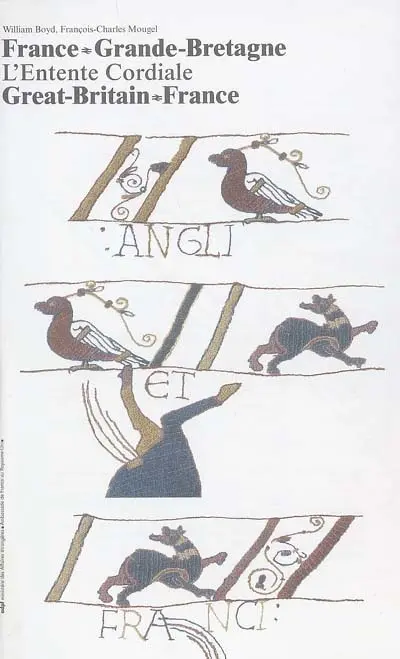en savoir plus

Permet à tous ses détenteurs d'obtenir 5% de réduction sur tous les livres lors du retrait en magasin (réduction non cumulable avec les réductions de type étudiant).
Offre également un certain nombre d'avantages auprès de nos partenaires.
Avec les favoris, retrouvez dans un espace les sélections effectuées au fur et à mesure de vos navigations dans le site.
Constituez pour votre usage personnel vos listes de livres en prévisions d'achats futurs et votre sélection d'articles, dossiers, événements, vidéos ou podcasts préférés ou à découvrir plus tard...
Il suffit simplement de cliquer sur "Ajout Favori" sur chaque page qui vous intéresse pour les retrouver ensuite dans votre espace personnel.
Requiert un compte Mollat
Requiert un compte Mollat
- Sciences humaines - Histoire
- Actualité internationale
- Relations et politiques internationales
- Actualité politique internationale
France-Grande-Bretagne : l'Entente cordiale. Great Britain-France : the Entente cordiale
Auteur : William Boyd
Auteur : François-Charles Mougel
en savoir plus
Résumé
Mise en perspective historique de l'Entente cordiale dont est célébré en 2004 le centenaire. Présente un panorama des études récentes des intellectuels français et britanniques sur les relations entre les deux pays, quelques réflexions de l'écrivain W. Boyd sur quelques traits culturels français, enfin une sélection bibliographique des études croisées sur le "pays voisin". ©Electre 2026
Quatrième de couverture
Entente cordiale... Nom donné par Guizot au rapprochement franco-britannique qui, ébauché à l'époque de la monarchie de Juillet, permit à la France de sortir de l'isolement diplomatique qui fit suite à la révolution de 1830. Cette politique, que Napoléon III tenta de poursuivre (alliance franco-britannique lors de la guerre de Crimée, 1854-1856), fut longtemps entravée par les nombreuses rivalités qui opposaient les deux pays, en particulier sur les questions coloniales (1898). -> Fachoda. Pourtant, face à l'essor de l'Allemagne, la France, qui s'était déjà alliée à l'Italie et à la Russie, se rapprocha à nouveau de la Grande-Bretagne, rapprochement facilité par l'ambassadeur Paul Cambon. Les accords signés en avr. 1904 réglaient les divers différends entre les deux pays ; en compensation de la cession de ses droits sur l'Égypte, la France obtenait des droits sur le Maroc; ces accords furent renforcés lors de la conférence d'Algésiras (1906), puis avec l'incident d'Agadir* (1911).
--Petit Robert. Dictionnaire universel des noms propres, Dictionnaires Le Robert, Paris, 1994, p. 665
Entente cordiale, a phrase sometimes used to describe the unofficial understanding between Great Britain and France in the years 1831-46, and more commonly to refer to the friendly relationship established between the two countries by a diplomatic agreement of Apr. 8, 1904.
The most important fruit of the "first entente" was Anglo-French cooperation in the establishment of the independent Kingdom of Belgium (1831-39). Disrupted by the mutual animosity of Palmerston and Adolphe Thiers in the Egyptian crisis of 1840, good relations were restored by King Louis-Philippe's removal of Thiers and the establishment of a conservative London-Paris axis by Aberdeen and François Guizot. The return of Palmerston to the British Foreign Office in July 1846 was taken by the French government as signifying the end of good relations, and the first entente ended in the affair of the Spanish Marriages (See FRANCE : History).
In common historical usage, the term is more frequently applied to the relationship between Great Britain and France from 1904 to 1914. At the turn of the century, Anglo-French relations were strained throughout the world. In April 1904 a series of agreements settled their difficulties over Newfoundland fisheries, Siam, Madagascar and the New Hebrides, modified certain colonial boundaries in Africa, and provided that Britain and France should renounce their rights and interest in Morocco and Egypt respectively in favour of the other. This reconciliation of the two rivals profoundly affected the situation in Europe. In 1905 Germany tested the new entente cordiale by challenging the activity of France in Morocco; but Britain stood firmly by France, offering military help if necessary, and Germany suffered a serious diplomatic defeat.
During the crisis, the British and French general staffs began conversations and ultimately worked out plans which should be put into effect if Britain should decide to support France in war against Germany. This was the second stage of the entente.
In 1911 Germany for a second time challenged French policy in Morocco, and again Britain supported France, a member of the government (David Lloyd George) in a speech warning Germany against war. [...]
-- Encyclopcadia Britannica, vol 8, 1962, p. 619
Fiche Technique
Paru le : 02/11/2004
Thématique : Actualité politique internationale
Auteur(s) : Auteur : William Boyd Auteur : François-Charles Mougel
Éditeur(s) :
ADPF-Publications
Collection(s) : Non précisé.
Contributeur(s) : Préfacier : Jean-Pierre Angremy
Série(s) : Non précisé.
ISBN : Non précisé.
EAN13 : 9782914935241
Reliure : Broché
Pages : 127
Hauteur: 25.0 cm / Largeur 15.0 cm
Épaisseur: 1.1 cm
Poids: 260 g

